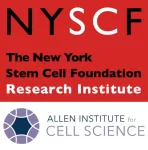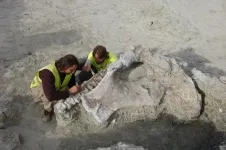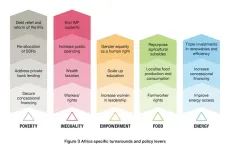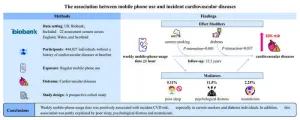(Press-News.org) Feeld, the dating app for the curious, in collaboration with Dr. Justin Lehmiller of The Kinsey Institute, has released a groundbreaking report, "The State of Dating: How Gen Z is Redefining Sexuality and Relationships." Released on World Sexual Health Day under the theme #PositiveRelationships, this report takes a deep dive into how Gen Z—shaped by global instability, digital immersion, and evolving cultural scripts—are shaping their approach to dating and sexuality.
After analyzing the latest data from Feeld’s diverse community and drawing insights from broader Kinsey Institute research, this new report reveals how Gen Z is carving out its own paths in sexuality, embracing fluid identities, and reimagining traditional relationship structures to reflect their complex realities. Dr. Lehmiller examines broader generational trends, attitudes and behaviors towards sexuality and relationships that vary for Gen Z, Millennial, Gen X, and Boomer adults.
The contrast is most visible between the youngest and the oldest of the studied generations – for instance, Gen Z’s romanticized views on monogamy vs. Boomers’ preference for a casual friends-with-benefits structure.
Key Findings
Monogamy
Despite the common perception that Gen Z is moving away from traditional relationship structures, monogamy actually emerges as the most preferred relationship style at 23% for Feeld’s Gen Z Members where only 15% prefer a non-monogamous relationship.
This stands in contrast to Millennials and Gen X, where ethical non-monogamy is favored by 24% and 27% respectively.
Meanwhile, monogamy is preferred by 16% of Millennials and only 9% of Gen X.
27% of Boomers prefer friends with benefits, versus just 12% who prefer monogamy.
81% of Gen Zers fantasize about monogamy, with 44% fantasizing about it often—nearly twice as much as older generations.
Sexual and Gender Fluidity
59% of Gen Z Feeld Members report a sexual identity other than heterosexual, while 18% identify as gender diverse.
These figures are significantly higher than national averages reported by Gallup and Pew, where nearly 1 in 5 Gen Z adults identify as LGBTQ.
Feeld Members demonstrate significant fluidity in sexual and gender identities, with 10% of Gen Zers reporting a change in gender identity since joining the app, and 18% reporting a change in sexual identity.
This trend aligns with Kinsey Institute findings, which indicate that younger generations are increasingly open to exploring and redefining their identities over time.
Kink Exploration
55% of Gen Zers on Feeld have discovered a new kink since joining the app, making them the most explorative generation in this regard.
In comparison, 49% of Millennials, 39% of Gen X, and 33% of Boomers reported similar discoveries.
This trend mirrors broader research showing that Gen Z is leading the rise in kink and BDSM interests, with 56% of Gen Z reporting BDSM fantasies according to Dr. Justin Lehmiller’s research, compared to just 12% of Boomers.
Contextual Analysis
Gen Z’s approach to monogamy and fluid identities reflects a reimagining of traditional values through a contemporary lens. With the Feeld community serving as the more progressive and accepting of emerging cultural shifts, Gen Zers as a whole are leading the charge in demonstrating how sexual and gender identities are becoming part of people’s evolving journeys rather than fixed points.
"The data from Feeld Members offers a fascinating glimpse into how Gen Z is redefining relationships. Their openness to exploring more fluid ways of being, coupled with an unexpected affinity for monogamy, suggests a generation that is simultaneously challenging and embracing tradition,” said Dr. Justin Lehmiller, Kinsey Institute. “What is also striking is how, compared to the national average, the Feeld community seems to be a lot more open to exploring, defining, and redefining who they really are, which helps advance our work on understanding where sexuality and relationships are headed within a broader cultural context."
Implications for the Future
“Feeld is non-prescriptive by design, intentionally maintaining a space for exploration without judgment. We build the app with and for our Members - they are the ones who truly shape the future of dating, self-exploration, and relationships,” said Ana Kirova, CEO of Feeld. “For me, the essence of the insights here is that each person’s and every generation’s evolution is constant and often unpredictable. I hope that in seeing these discoveries, we all feel inspired to hold space for our shared human experience in all its fluidity.”
As Gen Z continues to redefine the landscape of sexuality and relationships, this report captures a pivotal moment in their journey of self-discovery. The findings highlight a generation that is navigating the fluidity of identity and relationship styles with a blend of tradition and modernity, and in doing so, they are reshaping societal norms.
Read the full report here to explore the findings in more detail.
About the Kinsey Institute at Indiana University
For over 75 years, the Kinsey Institute has been the premier research institute on human sexuality and relationships and a trusted source for evidence-based information on critical issues in sexuality, gender, reproduction, and well-being. The Kinsey Institute's research program integrates scholarly fields including neuroscience, psychology, public health, anthropology, history, and gender studies. Kinsey Institute outreach includes traveling art exhibitions, public scholarships, research lectures, and a human sexuality education program. Visit our website kinseyinstitute.org and follow us on LinkedIn.
About Feeld
Feeld is the dating app for the curious; those open to experiencing people and relationships in new ways. Founded in 2014 by Ana Kirova and Dimo Trifonov after questioning the status quo of their own relationship, they were inspired to challenge cultural scripts around gender, sexuality, and dating on a global scale. Feeld’s ever-evolving platform creates a safer space online and IRL for people to explore their curiosities outside of existing blueprints and find meaningful human connections of all kinds. Feeld has led with a progressive mindset since its inception, pioneering a remote-first work model with a globally distributed team. With over 20 sexuality and gender options in-app and growing, Feeld is a space for the experiences that make us feel alive and most intimately connected to ourselves and others. Learn more at www.feeld.co.
END
The state of dating report: How Gen Z is transforming sexuality and relationships
Groundbreaking insights from a Feeld and Kinsey Institute study
2024-09-04
ELSE PRESS RELEASES FROM THIS DATE:
Allen Institute for Cell Science and New York Stem Cell Foundation join forces to advance inclusive cellular biology
2024-09-04
Seattle, WA and New York, NY—September 4, 2024—Today, the Allen Institute for Cell Science and New York Stem Cell Foundation (NYSCF) announced a pioneering collaboration to address this critical issue, combining two cutting-edge technologies to create more inclusive cellular models for studying disease. This partnership will introduce the Allen Institute for Cell Science’s structure tags into NYSCF’s collection of ethnically diverse stem cell lines. The result: an unprecedented resource that will enable researchers to examine disease mechanisms and potential treatments across a ...
Photosynthesis in near darkness
2024-09-04
Photosynthesis can take place in nature even at extremely low light levels. This is the result of an international study that investigated the development of Arctic microalgae at the end of the polar night. The measurements were carried out as part of the MOSAiC expedition at 88° northern latitude and revealed that even this far north, microalgae can build up biomass through photosynthesis as early as the end of March. At this time, the sun is barely above the horizon, so that it is still almost completely dark in the microalgae's habitat under the snow and ice cover of the Arctic Ocean. The results of the study now published in the journal Nature Communications show that photosynthesis ...
Newly discovered viruses in parasitic nematodes could change our understanding of how they cause disease
2024-09-04
New research shows that parasitic nematodes, responsible for infecting more than a billion people globally, carry viruses that may solve the puzzle of why some cause serious diseases.
A study led by Liverpool School of Tropical Medicine (LSTM) used cutting-edge bioinformatic data mining techniques to identify 91 RNA viruses in 28 species of parasitic nematodes, representing 70% of those that infect people and animals. Often these are symptomless or not serious, but some can lead to severe, ...
Qunkasaura: New sauropod dinosaur from the Cretaceous discovered in the Iberian Peninsula
2024-09-04
A new study led by Portuguese paleontologist Pedro Mocho, from the Instituto Dom Luiz of the Faculty of Sciences of the University of Lisbon (CIÊNCIAS), has just been published in the Communications Biology journal, which announces a new species of sauropod dinosaur that lived in Cuenca, Spain, 75 million years ago: Qunkasaura pintiquiniestra.
The more than 12,000 fossils collected from 2007 onwards during works to install the Madrid-Levante high-speed train (AVE) tracks revealed this deposit, giving rise to one of the most relevant collections ...
Sports concussions in non-athletes not linked to long-term cognitive effects: study
2024-09-04
Sports-related concussions (SRC) may not be associated with long-term cognitive risks for non-professional athletes, a study led by a UNSW medical researcher suggests. In fact, study participants who had experienced an SRC had better cognitive performance in some areas than those who had never suffered a concussion, pointing to potential protective effects of sports participation.
Published in the Journal of Neurology, Neurosurgery and Psychiatry (JNNP), the research reveals that individuals who reported experiencing any SRC during their lifetime had a marginally better cognitive performance than those who reported no concussions.
The study, a collaboration ...
Spurring more biofilm growth for efficient wastewater treatment
2024-09-04
For the sake of the environment and our quality of life, effective treatment of wastewater plays a vital role. A biological method to treat sewage using moving, biofilm-covered plastic items known as carriers has been gaining prominence, and an Osaka Metropolitan University-led team has found ways to make the process more efficient.
The moving bed biofilm reactor (MBBR) process purifies wastewater by putting these carriers in motion to get the biofilm’s microorganisms into greater contact with organic matter and other impurities. The more biofilm that can be attached ...
In world 1st, high-quality feline iPSCs generated without genetic footprint
2024-09-04
A common image of cats today comes in the form of cute cat memes online, but these furry felines commonly experience kidney disease. Amid advances in medicine to improve people’s quality of life, an Osaka Metropolitan University-led team has, for the first time in the world, generated high-quality feline induced pluripotent stem cells (iPSCs), which have the potential to help companion animals and humans alike.
Human iPSCs have been generated using just four genes known as transcription factors, but feline iPSCs have been difficult to generate. Graduate School of Veterinary Science Professor Shingo Hatoya led the team in introducing six transcription factors via the Sendai virus ...
How Sub-Saharan Africa can achieve the SDGs by 2100: A new report by Earth4All
2024-09-04
In the best-case scenario, called the "Giant Leap," Sub-Saharan Africa could see poverty drop from 500 million to 25 million people, hunger nearly eradicated, and universal access to education, clean water, and sustainable electricity. On the other hand, the "Too Little Too Late" scenario paints a grim picture where poverty rises to 900 million, hunger still affects 180 million, and over a billion people lack clean water. The Too Little Too Late scenario is based on existing policies in the region. These two scenarios highlight the critical importance of action this decade to drive five extraordinary turnarounds in the areas of poverty, inequality, ...
New research shows regular mobile phone use can increase the risk of cardiovascular diseases, especially in smokers and people with diabetes
2024-09-04
Philadelphia, September 4, 2024 – A new study has found that regular mobile phone use was positively associated with incident cardiovascular diseases risk, especially in current smokers and individuals with diabetes. In addition, this association was partly attributed to poor sleep, psychological distress, and neuroticism. The article in the Canadian Journal of Cardiology, published by Elsevier, details the results of this large-scale prospective cohort study.
Yanjun Zhang, MD, Division of Nephrology, Nanfang Hospital, Southern Medical University, Guangzhou, China, explains, "Mobile phone use is a ubiquitous exposure in modern society, so exploring its impact on health has ...
Can you identify the new threat attracting Gen Z to nicotine use?
2024-09-04
COLUMBUS, Ohio – About half of adults can identify cigarettes and e-cigarettes, but just one in four would recognize oral nicotine pouches, and these easily available products are growing increasingly popular among teens and young adults, according to a recent study commissioned by The Ohio State University Comprehensive Cancer Center – Arthur G. James Hospital and Richard J. Solove Research Institute (OSUCCC – James).
Oral nicotine pouches are small packets filled with a flavored powder containing nicotine and other chemicals that are tucked between the lip and gums. ...
LAST 30 PRESS RELEASES:
Americans don’t just fear driverless cars will crash — they fear mass job losses
Mayo Clinic researchers find combination therapy reduces effects of ‘zombie cells’ in diabetic kidney disease
Preventing breast cancer resistance to CDK4/6 inhibitors using genomic findings
Carbon nanotube fiber ‘textile’ heaters could help industry electrify high-temperature gas heating
Improving your biological age gap is associated with better brain health
Learning makes brain cells work together, not apart
Engineers improve infrared devices using century-old materials
Physicists mathematically create the first ‘ideal glass’
Microbe exposure may not protect against developing allergic disease
Forest damage in Europe to rise by around 20% by 2100 even if warming is limited to 2°C
Rapid population growth helped koala’s recovery from severe genetic bottleneck
CAR-expressing astrocytes target and clear amyloid-β in mouse model of Alzheimer’s disease
Unique Rubisco subunit boosts carbon assimilation in land plants
Climate change will drive increasing forest disturbances across Europe throughout the next century
Enhanced brain cells clear away dementia-related proteins
This odd little plant could help turbocharge crop yields
Flipped chromosomal segments drive natural selection
Whole-genome study of koalas transforms how we understand genetic risk in endangered species
Worcester Polytechnic Institute identifies new tool for predicting Alzheimer’s disease
HSS studies highlight advantages of osseointegration for people with an amputation
Buck Institute launches Healthspan Horizons to turn long-term health data into Actionable healthspan insights
University of Ottawa Heart Institute, the University of Ottawa and McGill University launch ARCHIMEDES to advance health research in Canada
The world’s largest brain research prize awarded for groundbreaking discoveries on how we sense touch and pain
Magnetofluids help to overcome challenges in left atrial appendage occlusion
Brain-clearing cells offer clues to slowing Alzheimer’s disease progression
mRNA therapy restores fertility in genetically infertile mice
Cloaked stem cells evade immune rejection in mice, pointing to a potential universal donor cell line
Growth in telemedicine has not improved mental health care access in rural areas, study finds
Pitt scientists engineer “living eye drop” to support corneal healing
Outcomes of older adults with advanced cancer who prefer quality of life vs prolonging survival
[Press-News.org] The state of dating report: How Gen Z is transforming sexuality and relationshipsGroundbreaking insights from a Feeld and Kinsey Institute study







